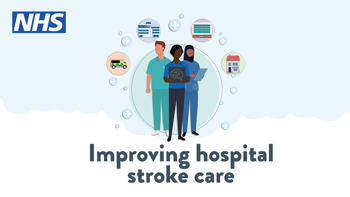Major plan for local stroke services gets go-ahead
Thursday, 8 September 2022

A comprehensive stroke centre for North Mersey is to be created at Aintree University Hospital, dedicated to caring for people in the critical 72-hour period after a stroke occurs.
The new centre will bring together the hyper-acute stroke care currently based at the Royal Liverpool University Hospital, Aintree University Hospital, and Southport Hospital.
Providing this service from a single unit is designed to improve access to the specialist staff, tests, equipment and procedures that are crucial for diagnosing and treating people as quickly and effectively as possible following a stroke.
Locating the comprehensive stroke centre at Aintree Hospital means it will be on the same site as The Walton Centre, the specialist neurosciences hospital, which provides a stroke treatment called thrombectomy, available 24 hours a day, seven days a week. It’s hoped that creating the comprehensive stroke centre will significantly increase the number of local patients able to receive thrombectomy within the required time window.
The proposal does not involve any reduction in NHS funding for stroke care locally – in fact, it will see extra investment made in services to enable the change.
The comprehensive stroke centre proposals were developed by clinicians from Liverpool University Hospitals NHS Foundation Trust, Southport & Ormskirk Hospital NHS Trust and The Walton Centre NHS Foundation Trust.
Dr Claire Cullen, Stroke Consultant at Liverpool University Hospitals NHS Foundation Trust, which runs Aintree University Hospital, Royal Liverpool University Hospital and Broadgreen Hospital, said: “This decision is fantastic news for our local communities, who will now benefit from improved hyper-acute stroke care and a service that has been designed so that patients experience the best outcomes possible following a stroke, when specialist intervention is key and every moment counts.”
Dr Paddy McDonald, Stroke Consultant, Southport & Ormskirk Hospital NHS Trust said: “This service was developed by people who care for stroke patients and really understand what a difference timely diagnosis and treatment can make.
“Some journeys to hospital will take longer but this is in return for faster, specialised and joined up care once you arrive with a proven better outcome for each patient’s future health.
“It’s an approach we know has already been shown to improve care for stroke patients in many other parts of the country. It’s absolutely right that everyone in my local community benefits from that very best care too.”
Between 22 November 2021 and 14 February 2022, more than 600 people took part in a 12-week public consultation about the plans. The consultation was held by the NHS in Knowsley, Liverpool, Sefton and West Lancashire – the main areas which use these services. Feedback received during the consultation was used to produce a final business case, which was approved by hospital trusts and NHS Cheshire and Merseyside during the summer, before being put to a joint local authority overview and scrutiny committee (OSC) yesterday (7 September 2022).
Changes are due to start taking place later this month, which will mean that all suspected stroke patients will be taken by ambulance straight to Aintree University Hospital for the first 72-hours of stroke care – even those who would previously have been treated at the Royal Liverpool University Hospital or Southport Hospital. Any patients who present themselves at accident and emergency at the Royal Liverpool or Southport hospitals and are believed to have had a stroke, will be transferred by ambulance to Aintree.
Should a patient be suitable for the specialist thrombectomy treatment for their stroke, they will be transferred to The Walton Centre for this procedure.
After the first 72-hours, up to half of patients will be able to leave hospital to continue their recovery at home, with help from an early supported discharge team. Those patients who aren’t ready to go home, will be given further care at either Aintree, Broadgreen or Southport hospitals, depending on which is closest to where they live.
As part of the change, the Royal Liverpool Hospital and Southport Hospital will no longer provide hyper-acute stroke care. Southport will continue to provide acute stroke care, so that patients who would previously have been admitted to Southport can have their next stage of treatment closer to home. There will be no stroke unit offering acute care at the Royal Liverpool, however Broadgreen Hospital would continue to be used for stroke rehabilitation services. Aintree Hospital will provide acute stroke care, as well as hyper-acute stroke care, as it does now.
There are no changes to outpatient care planned – patients should attend any appointments as usual, unless advised otherwise by the hospital providing their care.